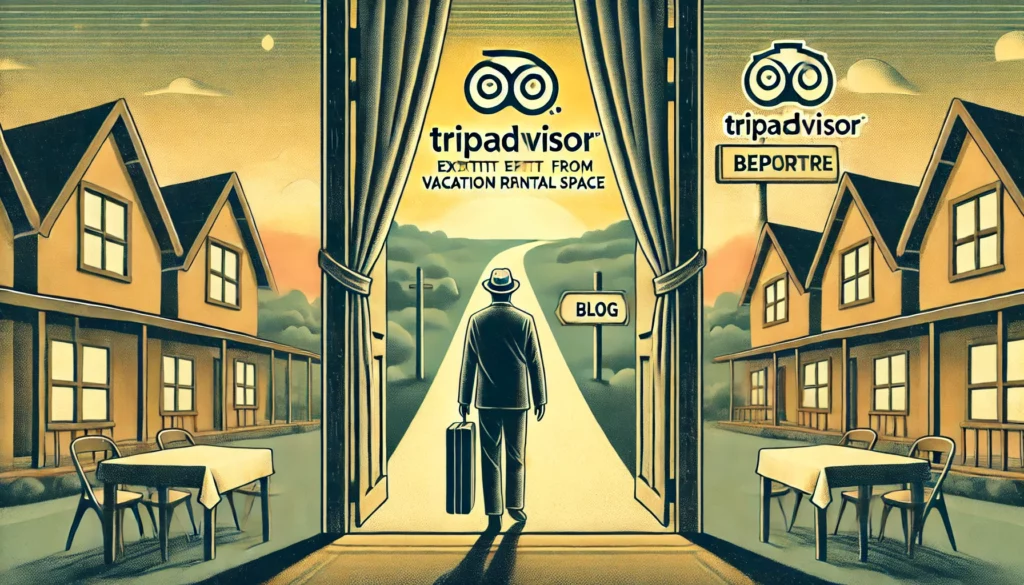Imagine waking up to find that one of your long-standing vacation rental listing platforms has decided to stop accepting bookings, leaving you scrambling to adjust. That’s exactly what many property managers discovered when Tripadvisor announced a significant pivot in its vacation rental strategy, effective November 1.
With this news, effective November 1, professional managers must adjust course quickly. But this isn’t just a story of a single platform scaling back—it may signal deeper shifts in the short-term rental landscape. Let’s unpack what’s happening and explore the broader implications.
Tripadvisor’s Abrupt Exit: What You Need to Know
On September 2024, Tripadvisor informed vacation rental hosts and guests that, effective November 1, it would no longer allow bookings on its platform or through its sub-brands like FlipKey, Holiday Lettings, and Niumba. All reservations scheduled for check-in on or after November 1 will be canceled, with full refunds issued to guests.
By the end of September, the platform will have disabled booking capabilities entirely. For hosts who rely on these channels, this transition will require immediate action to avoid disruptions.
Tripadvisor’s official statement clarifies that it will now pivot to a third-party provider model for vacation rentals, much like how it handles hotel listings. Instead of directly managing bookings, it will showcase vacation rental listings from external partners and redirect users to those third-party sites for finalizing reservations. For an industry that has long dealt with increasing platform consolidation, this move further reinforces the trend.
Why is Tripadvisor Moving Away from Direct Rentals?
To understand why Tripadvisor is stepping back, we need to rewind the clock. Tripadvisor entered the vacation rental game with several acquisitions, including FlipKey, Holiday Lettings, and Niumba. At its peak, Tripadvisor was a major player in the vacation rental market, providing stiff competition to platforms like HomeAway (now Vrbo).
However, Tripadvisor’s momentum in the vacation rental space slowly diminished. The platform never became a go-to source for bookings the way Airbnb, Vrbo, or Booking.com did. In fact, over time, its revenue from alternative accommodations (which includes vacation rentals) shrank to less than 3% of its total revenue.
Regulatory issues also contributed to this decision. Tripadvisor disclosed $10 million in accrued expenses and additional liabilities related to its vacation rental business. This financial strain, coupled with its shrinking market share, led to the current shift away from direct vacation rental bookings.
What Does This Mean for Professional Short-Term Rental Managers?
For most professional managers, the loss of bookings from Tripadvisor may not be a monumental hit. Many had already stopped relying on it as a significant source of reservations. As Bob Garner of Casal dei Fichi, a luxury property in Italy, puts it: “At Casal dei Fichi, we have used Tripadvisor for nearly 20 years, but it is not a channel we use to get bookings.” Garner’s sentiment echoes that of many property managers who have shifted their focus toward other, more prominent platforms like Airbnb and Booking.com over the years.
However, there’s another critical aspect of this shift: reviews.
Reviews are the currency of trust in the short-term rental world. While Tripadvisor may not have provided the bulk of bookings, many managers used it as a platform to collect and showcase reviews. Garner adds, “I would hate to lose those 650 5-star reviews.”
Fortunately, Tripadvisor has confirmed that property pages, including their reviews, will remain live for the time being. This is a significant relief for those who have spent years building up their reputation on the platform.
But what happens next? Tripadvisor’s promise to keep reviews intact is reassuring, but if there are no new bookings, there will likely be no new reviews. This stagnation could become a problem over time as fresh reviews are key to maintaining visibility and trust.
The Shift in Power: What Tripadvisor’s Move Means for the Booking Ecosystem
While Tripadvisor’s exit may seem like a minor shift in the booking ecosystem, it highlights the growing concentration of power among the big three: Airbnb, Booking.com, and Vrbo. Tripadvisor’s share of vacation rental bookings has been declining for years, so this move won’t significantly increase the market share of the big players. But it does continue a trend of consolidation, where fewer platforms control more of the booking flow.
More interestingly, though, is what this might mean for Google Vacation Rentals. Google has been quietly but steadily expanding its role in the vacation rental space. Unlike Tripadvisor, Google doesn’t handle bookings directly. Instead, it acts as a connector, integrating with professional property management systems (PMS) and directing users to complete bookings on third-party sites.
Google’s influence is growing, especially in light of recent changes to its search algorithms. Google now prominently features AI-driven summaries in search results, drawing from various sources, including social media and review sites. With Tripadvisor no longer facilitating new reviews, Google’s review system could gain more traction. This could create a subtle but significant shift in how potential guests search for and evaluate properties, tilting the balance of power further in Google’s favor.
What Should Property Managers Do Next?
While Tripadvisor’s exit from the direct vacation rental booking space may not shake the industry at its core, it’s an important reminder to diversify your strategies. If you’ve relied on Tripadvisor to collect reviews, it may be time to explore other platforms like Google or even direct booking sites where you can better control guest feedback and visibility.
The landscape of short-term rental platforms is evolving rapidly, and professional managers must stay nimble. The loss of one player, especially a legacy brand like Tripadvisor, may not seem monumental in terms of booking volume, but its long-term effects on reviews, search results, and power dynamics in the industry are something to watch.








